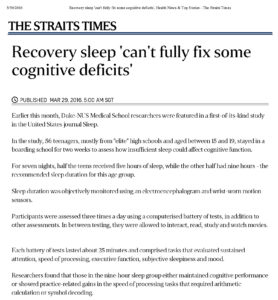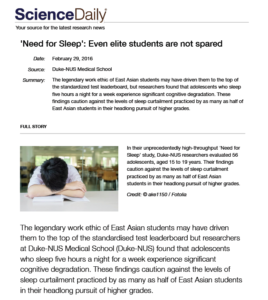Home > News Archive
News Archive
In the News
Earlier this month, Duke-NUS Medical School researchers were featured in a first-of-its-kind study in the United States journal Sleep. In the study, 56 teenagers, mostly from “elite” high schools and aged between 15 and 19, stayed in a boarding school for two weeks to assess how insufficient sleep could affect cognitive function. For seven nights, half the teens received five hours of sleep, while the other half had nine hours – the recommended sleep duration for this age group.
Read MoreThe legendary work ethic of East Asian students may have driven them to the top of the standardized test leaderboard, but researchers found that adolescents who sleep five hours a night for a week experience significant cognitive degradation.
Read MoreAnyone who has ever driven home after a red-eye flight or sat through an important but interminable lecture will know the feeling: You’re commanding your brain to stay awake, yet your eyelids feel heavy as lead and they just keep falling shut. Now a team of neuroscientists based in Singapore has documented what’s going on in the brain when the battle to stay awake is momentarily lost. Ju Lynn Ong and her colleagues put 18 healthy participants in a sleepy state by keeping them awake all night in a psych lab. After being awake for 22 straight hours, the participants were asked to lay in the dark inside a brain scanner for two six-minute scans — and to keep their eyes open the whole time.
Read MoreOlder adults who sleep less show evidence of a more rapid decline in cognitive performance, according to a study by Duke-NUS Graduate Medical School Singapore.
Read MoreResearchers at Duke-NUS Graduate Medical School Singapore (Duke-NUS) have found evidence that the less older adults sleep, the faster their brains age. These findings, relevant in the context of Singapore’s rapidly ageing society, pave the way for future work on sleep loss and its contribution to cognitive decline, including dementia.
Read MoreLast year, an opinion-editorial that I wrote on the perils of short sleep received an unexpected flood of attention. Some wrote tongue-in-cheek commentaries on local sleep patterns. A few concerned parents made appeals on forum pages to have morning-session secondary schools start later. Others thanked me for helping them counsel their children. Is this acknowledgement that the effects of sleep on health are being taken more seriously? Perhaps not.
Read MoreThe rising cost of healthcare and the burden of chronic illness are perennial concerns. Remarkably, there exists a measure that a quarter to a third of city dwellers can implement to reduce their risk of accidents, coronary artery disease, diabetes, cancer and all-cause mortality, while improving their cognitive performance.
Read MoreAnecdotally, we know we make worse decisions when we’re tired than after a good night’s sleep. Now, a new study published in the Journal of Neuroscience puts a finer point on the link between sleep deprivation and unwise decision-making, finding that a sleepy brain tends to make overly optimistic gambles.
Read MoreSleep deprivation can lead to plenty of unwise decisions, which researchers have long tied to flagging attention and short-term memory. But a new study shows how just one night of missed sleep can make people more likely to chase big gains while risking even larger losses—independent of their tapering attention spans.
Read MoreSleep deprivation may lead to overly optimistic thinking that fails to properly consider the potential consequences of financial risks, a new study suggests.
Read More- « Previous
- 1
- 2
- 3
- 4










